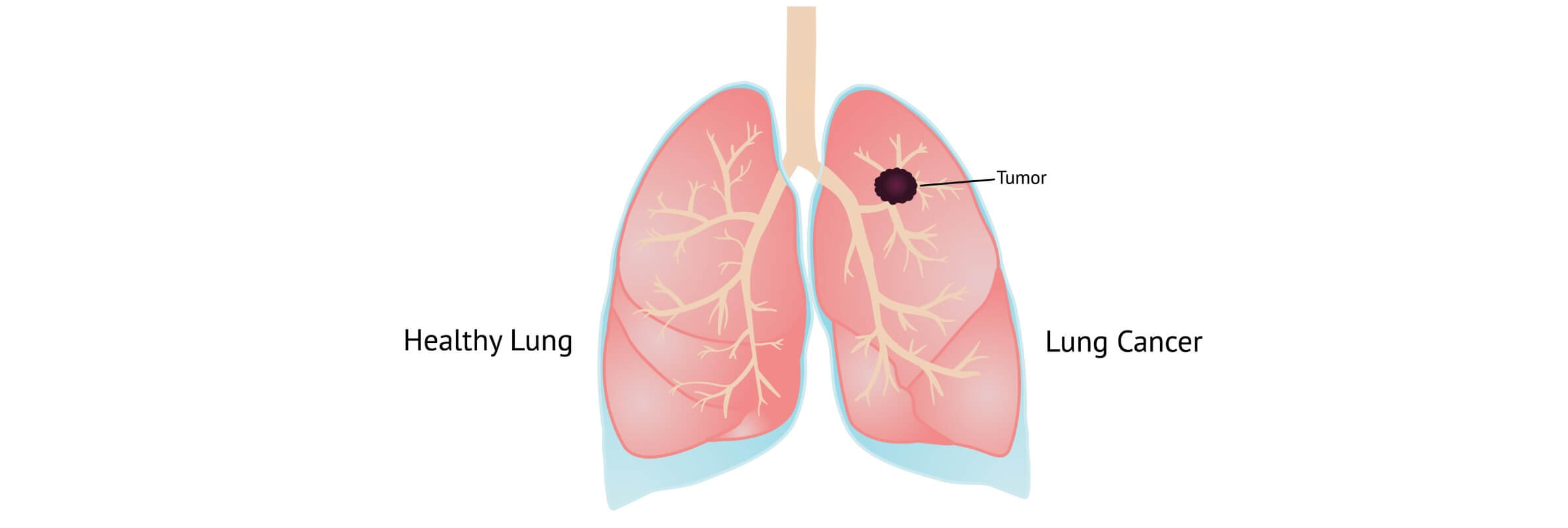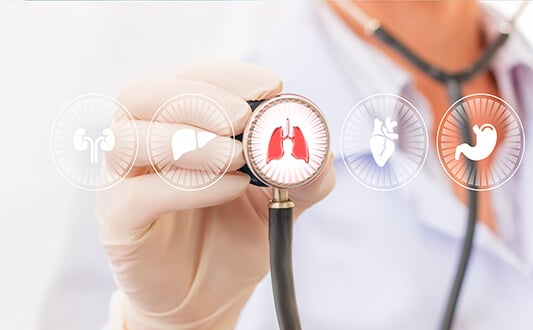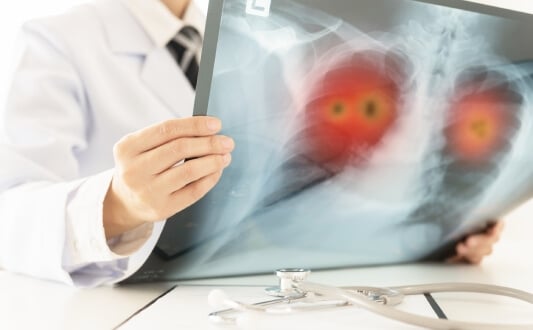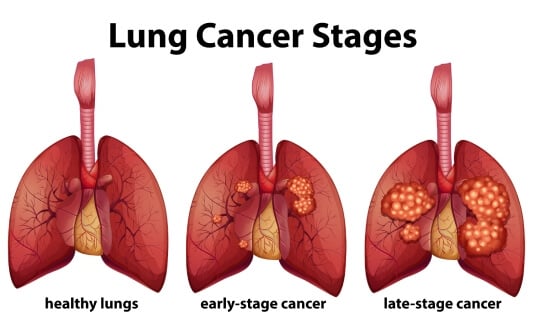Рак легкого – это одно из наиболее распространенных и агрессивных злокачественных заболеваний в мире, которое остается серьезной проблемой общественного здравоохранения. По данным Немецкого центра исследования рака, в 2020 году в Германии было диагностировано около 56 700 новых случаев рака легкого: 34 100 у мужчин и 22 590 у женщин [1]. Стандартизированные по возрасту показатели заболеваемости раком легкого составили 51,8 случаев на 100 000 мужчин и 31,4 случая на 100 000 женщин [2]. Рак легкого стал причиной 27 751 смертей среди мужчин и 17 066 среди женщин, поэтому он считается наиболее частой причиной смерти от рака у мужчин (22,8%) и второй по частоте причиной смерти у женщин (15,8%) [1].
Прогноз для пациентов с раком легкого существенно различается в зависимости от стадии заболевания на момент постановки диагноза. Показатель относительной 5-летней выживаемости составляет приблизительно 25% у женщин и 19% у мужчин. Решающее значение для достижения хорошего результата лечения имеют регулярные скрининговые обследования и раннее выявление онкопатологии, поскольку на начальных стадиях рак легкого зачастую протекает бессимптомно, что затрудняет его своевременную диагностику и ограничивает возможности лечения. [3]
Несмотря на эти сложности, Германии удалось занять лидирующие позиции в мире в области лечения рака легкого. В этой стране пациентам предлагается развитая медицинская инфраструктура и широкий спектр инновационных методов лечения рака легкого, благодаря которым здесь регулярно улучшаются показатели выживаемости и качество жизни онкобольных. При выборе в пользу лечения в Германии пациенты с раком легкого получают доступ к комплексной медицинской помощи и новейшим методам лечения. Благодаря особому акценту на персонализированное обслуживание пациентов и непрерывному проведению научных исследований в области медицины, в немецких клиниках достигаются прекрасные результаты лечения, что является основанием для надежды для онкобольных со всего мира.
Стандартные методы в протоколах лечения рака легкого в Германии
Традиционные терапевтические методики по-прежнему составляют основу лечения рака легкого в Германии, особенно если речь идет о ранних и местнораспространенных стадиях заболевания [4]. Золотым стандартом лечения операбельного немелкоклеточного рака легкого (НМРЛ) считаются такие хирургические вмешательства: лобэктомия, сегментэктомия или полная резекция легкого (пневмонэктомия). После одной из этих операций чаще всего проводится адъювантная химиотерапия или лучевая терапия для уничтожения оставшихся раковых клеток и снижения риска развития рецидива. Мелкоклеточный рак легкого характеризуется агрессивным течением, поэтому при лечении этого заболевания в Германии обычно проводится системная терапия, например, химиотерапия и иммунотерапия.
Системная химиотерапия по-прежнему широко применяется для лечения неоперабельных форм рака или же используется в качестве составляющей мультимодального лечения. Лучевая терапия, включая модулированную по интенсивности лучевую терапию, проводится для уменьшения размеров опухоли, купирования симптомов и повышения показателей выживаемости. Для отслеживания эффективности химиотерапии и облучения проводится ПЭТ-КТ и анализы на биомаркеры, на основании которых принимаются решения касательно целесообразности проведения других видов терапии в ходе последующего наблюдения.
В Германии для лечения рака легкого также проводится иммунотерапия. В настоящее время этот метод все чаще включается в официальные протоколы лечения рака, особенно при борьбе с прогрессирующими или метастатическими формами заболевания. При проведении иммунотерапии применяются ингибиторы контрольных точек иммунного ответа, которые помогают собственной иммунной системе пациента распознавать и атаковать раковые клетки. Назначение иммунотерапии в комплексе с другими традиционными методами лечения обеспечивает сочетание стандартного и персонализированного подходов к терапии.
Передовые методы лечения в Германии
Терапия дендритными клетками
Терапия дендритными клетками стала значительным достижением в области иммунотерапии рака. Суть данного метода лечения состоит в следующем: производится забор дендритных клеток из крови пациента, после чего в лабораторных условиях они подвергаются воздействию опухоль-специфических антигенов и повторно вводятся пациенту для стимуляции таргетного иммунного ответа против раковых клеток.
Научные основы этой терапии заложил доктор Ральф Штейнман. За открытие важнейшей роли дендритных клеток в регуляции иммунного ответа в 2011 году ему была присуждена Нобелевская премия по физиологии и медицине [5]. Благодаря научным трудам Ральфа Штейнмана сейчас в арсенале врачей имеется новый метод лечения рака, действие которого направлено на «обучение» иммунной системы более эффективно распознавать опухоли и бороться с ними.
Проведенные в Германии клинические исследования продемонстрировали эффективность терапии дендритными клетками в лечении немелкоклеточного рака легкого (НМРЛ): например, согласно результатам исследований, у пациентов с прогрессирующим НМРЛ после курса терапии дендритными клетками показатель пятилетней выживаемости повысился до 25% по сравнению с 10% при схеме лечения без включения в нее этого метода. Кроме того, при применении терапии дендритными клетками в комплексе с цитокин-индуцированными клетками-киллерами (CIK) у пациентов с поздними стадиями рака показатель беспрогессиивной выживаемости повысился с 5,2 до 6,9 месяцев.
В современных протоколах лечения во многих случаях предусмотрено проведение терапии дендритными клетками в комбинации с гипертермией – метод, при котором опухолевые ткани преднамеренно нагреваются с целью стимуляции собственной иммунной системы пациента и повышения эффективности иммунотерапии. Гипертермия помогает повысить эффективность терапии дендритными клетками и способствует лучшей инфильтрации иммунных клеток в микроокружение опухоли.
Вместе с тем важно отметить, что при отборе пациентов для проведения терапии дендритными клетками зачастую учитываются результаты молекулярного профилирования опухоли и статус биомаркеров, с помощью которых определяется предположительный иммунный ответ.
Методы интервенционной радиологии
В Германии предлагается множество малоинвазивных процедур под визуальным контролем, за выполнение которых отвечают интервенционные радиологи. Следовательно, пациентам с неоперабельным или прогрессирующим раком легкого здесь доступен более широкий спектр терапевтических возможностей. Методы интервенционной радиологии обладают особой эффективностью в тех случаях, когда полноценное хирургическое вмешательство противопоказано из-за возраста, сопутствующих заболеваний или обширного распространения онкопроцесса.
Радиочастотная абляция (РЧА) – это метод, предполагающий применение высокочастотного электрического тока для генерации тепловой энергии, под воздействием которой происходит разрушение раковых клеток [6]. РЧА наиболее эффективна при локализованных опухолях легких небольшого размера. По данным исследований, при первичном проведении процедуры показатели успешности достигают 79,5%, а при повторном – 87,5%. У пациентов с впервые диагностированным раком легкого показатели 1-, 2- и 3-летней выживаемости составляют 100%, 86% и 43%, соответственно. Как правило, РЧА хорошо переносится пациентами. По сравнению с традиционным хирургическим вмешательством эта процедура обеспечивает более короткий период восстановления.
Микроволновая абляция (МВА) – это метод лечения, при котором для нагрева и уничтожения раковых клеток используется микроволновая энергия. Процедура отличается особой эффективностью при лечении опухолей крупного размера и новообразований с локализацией вблизи крупных кровеносных сосудов, поскольку в такой ситуации другие методы абляции не всегда способны обеспечить достаточно хороший результат. Согласно данным клинических исследований, 1-годичная выживаемость составляет 81,2%, а частота локального прогрессирования опухоли – 12,7%. По сравнению с РЧА микроволновая абляция способна обеспечивать формирование более крупных зон абляции, поэтому в определенных клинических ситуациях именно эта процедура считается предпочтительным вариантом лечения.
Криоабляция – принцип действия этой лечебной процедуры основан на замораживании опухолевой ткани, в результате чего достигается гибель раковых клеток и исключается повреждение здоровых тканей вокруг новообразования. Криоабляция вызывает минимальные болевые ощущения непосредственно в ходе ее проведения и после завершения процедуры. По данным одного из исследований, криоаблация обеспечивает 1- и 3-летнюю выживаемость в 91% и 59,6% случаев, соответственно. Данный метод лечения отличается высокой точностью и безопасностью, благодаря чему при необходимости есть возможность повторного проведения процедуры. Также криоабляция часто применяется для лечения опухолей, расположенных вблизи чувствительных анатомических участков.
Электрохимиотерапия (ЭХТ) – это инновационный метод лечения, сочетающий низкодозную химиотерапию с таргетным воздействием на злокачественное новообразование электрическими импульсами. Эти импульсы способствуют повышению проницаемости клеточных мембран, за счет чего обеспечивается более эффективное проникновение лекарственных препаратов в раковые клетки. ЭХТ продемонстрировала многообещающие результаты при резистентности опухолей к стандартной химиотерапии: у 64% пациентов наблюдался полный ответ на лечение и у 22% – частичный ответ на лечение, а также у 14% онкобольных удалось достигнуть стабилизации заболевания. В настоящее время электрохимиотерапия становится все более востребованным методом лечения, так как процедура обладает малой травматичностью, но при этом обеспечивает эффективный результат при лечении резистентных или рецидивирующих опухолей легких.

Артериальная эмболизация (АЭ) – этот метод лечения часто используется в паллиативных целях. Его суть состоит в блокировке кровоснабжения опухоли для сдерживания ее роста. У пациентов с гемоптизисом (кровохарканьем) на фоне рака легкого эмболизация бронхиальных артерий в 98,8% случаев обеспечивает технический успех, а в 82,1% случаев приводит к клиническому улучшению. АЭ позволяет добиться быстрого облегчения симптомов, а также дает возможность значительно улучшить качество жизни пациентов с поздними стадиями заболевания.
Профессор Ковач: Почему ЭХТ Стала Золотым Стандартом при Труднодоступных Опухолях
Трансартериальная химиоэмболизация (TACE)
TACE – это малоинвазивная процедура, при которой химиопрепараты вводятся непосредственно в кровеносные сосуды, питающие опухоль. Сразу же после таргетной доставки химиопрепаратов в просвет этих кровеносных сосудов вводятся эмболизирующие частицы или микросферы для их блокировки с целью лишения опухоли питательных веществ. Этот таргетный метод лечения позволяет достичь более высокой концентрации химиопрепаратов в онкологическом очаге, при этом минимизируя их системное воздействие на организм пациента. [7]
В клиниках Германии процедура TACE применяется в лечении пациентов с раком легкого 4 стадии, особенно при метастатическом поражении печени. По результатам исследований, медиана выживаемости после проведения трансартериальной химиоэмболизации составляет 11 месяцев, поэтому эта процедура является многообещающим методом паллиативного лечения поздних стадий рака.
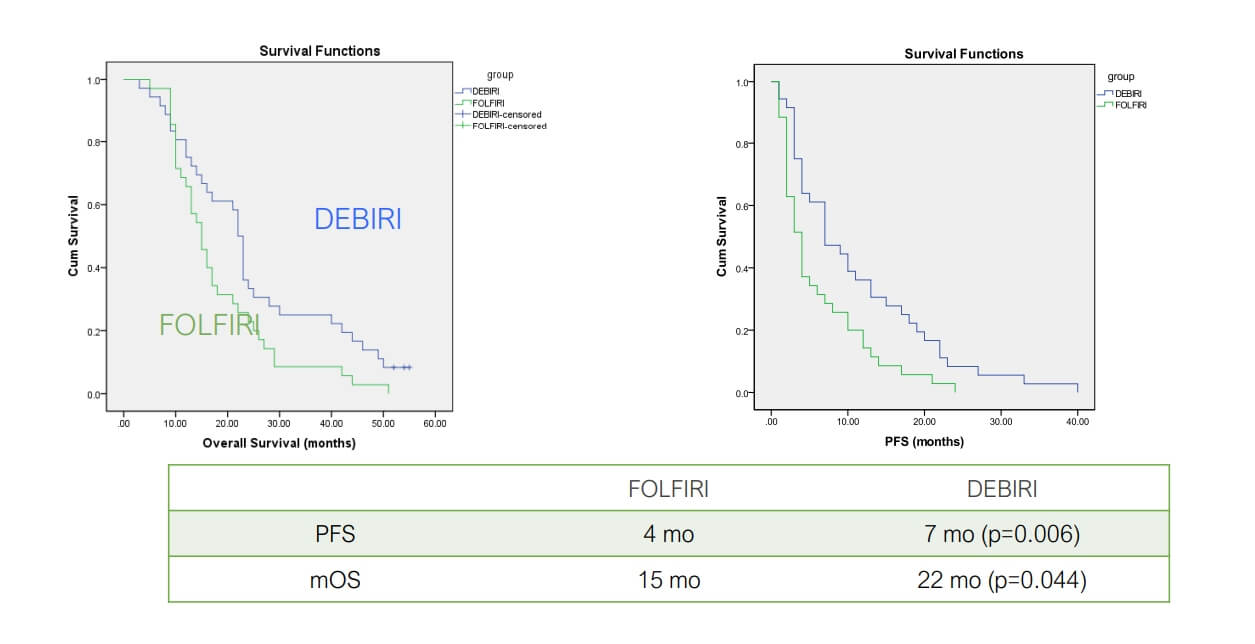
Aliberti C et al Ancancer Res 2011;31:4581
Richardson A et al J Vasc Interv Radiol 2013;24:1209
| Вид терапии | Показатели 2-летней выживаемости | Показатели ответа на лечение | Продолжительность курса лечения | Побочные эффекты |
|---|---|---|---|---|
| Стандартные методы лечения | ~25% на поздних стадиях рака | < 10% | Несколько циклов | Тяжелые побочные эффекты (тошнота, повышенная утомляемость, выпадение волос, иммуносупрессия, раздражение кожи) |
| Инновационные методы лечения | ~60% на поздних стадиях рака | ~45-65% | До 4 сеансов | Незначительные побочные эффекты (временные болевые ощущения или дискомфорт в месте проведения лечебной манипуляции) |
*Данные основаны на клинических результатах медучреждений Германии и статистике пациентов Booking Health
Ориентировочная стоимость методов лечения рака легкого в Германии
| Метод лечения | Ориентировочная стоимость (за полный курс лечения) | Доступность в Германии |
|---|---|---|
| Стандартные методы лечения | €80,000 - €150,000 | Повсеместно применяются в крупных клиниках |
| Инновационные методы лечения | €25,000 - €60,000 | Предлагаются в ведущих онкологических центрах |
*Фактическая стоимость лечения зависит от стадии опухоли, уровня клиники, в которой будет проходить терапия, и назначенной пациенту индивидуальной схемы лечения
Лучшие клиники по лечению рака легкого в Германии
Система здравоохранения Германии славится своими строгими процедурами сертификации, особенно в области онкологии. Немецкое онкологическое общество (Deutsche Krebsgesellschaft, DKG) одобряет сертификацию лишь для тех Центров по лечению рака легкого, которые соответствуют строгим критериям, гарантирующим высокое качество медицинской помощи, междисциплинарное обслуживание и соблюдение актуальных клинических рекомендаций.
Ниже представлена таблица с лучшими клиниками по лечению рака легких в Германии. Эти медучреждения пользуются безупречной репутацией благодаря предоставлению пациентам специализированных медицинских услуг, а также привносят значительный вклад в развитие пульмонологии и торакальной онкологии.
| Клиника | Город | Особенности |
|---|---|---|
| Специализированная пульмонологическая клиника Асклепиос Мюнхен-Гаутинг | Мюнхен | Крупнейший пульмонологический центр в Баварии, обладающий сертификацией Немецкого онкологического общества (DKG); входит в состав Центра по комплексному лечению пульмонологических заболеваний (CPC); принимает участие в клинических испытаниях. |
| Евангелическая пульмонологическая клиника Берлин | Берлин | С 2009 года имеет статус сертифицированного Центра по лечению рака легких; клиника признана центром компетенции в области торакальной хирургии; в медучреждении предлагается комплексная паллиативная помощь. |
| Университетская клиника Мюнхенского университета им. Людвига-Максимилиана | Мюнхен | Университетская больница при Мюнхенском университете Людвига-Максимилиана; здесь проводятся передовые научные исследования и предлагается ПЭТ-КТ диагностика; клиника является частью Центра по комплексному лечению пульмонологических заболеваний (CPC). |
| Клиника ViDia Карлсруэ | Карлсруэ | Академическая клиника Фрайбургского университета; здесь практикуются современные протоколы лечения и предоставляется междисциплинарная медицинская помощь. |
В этих клиниках предлагается лучшее лечение рака легких в Германии, соответствующее высочайшим стандартам качества. В вышеперечисленных медучреждениях используются новейшие технологии. Здесь под одной крышей работают врачи разных специальностей, которые совместно разрабатывают для каждого пациента индивидуальную схему лечения. Такой подход к медицинскому обслуживанию способствует улучшению результатов лечения и предоставляет пациентам доступ к самым передовым видам терапии, которые предлагает современная медицина.
История Сьюзен Кларк Ливингстон и ее успешный опыт лечения рака легкого в Германии
У Сьюзен Кларк Ливингстон диагностировали рак легкого 4 стадии. Врачи в США в прогнозировали ей не более шести месяцев жизни. Дочь Сьюзен была в отчаянии, но все же приступила к поиску альтернативных вариантов лечения для своей матери, который привел ее в Booking Health. Специалисты компании организовали для Сьюзен инновационное лечение рака легких в Германии в Онкологической клинике LDG Laboratories Берг под кураторством профессора Гансауге.
Сразу же после проведения терапии состояние Сьюзен существенно улучшилось. Команда онкологов в клинике Германии разработала для нее полностью персонализированную схему лечения, которая включала иммунотерапию дендритными клетками и тщательное последующее наблюдение. Терапия прошла с выдающимся успехом, благодаря чему удалось стабилизировать опухоль и значительно улучшить общее самочувствие Сьюзен.
«Благодаря исключительному профессионализму и стараниям профессора Гансауге и доктора Тауберта моя мама прожила на полтора года дольше, чем ей прогнозировали врачи в США после постановки диагноза», – говорит Джулия. «Мама все еще бегает по утрам, она отрастила густые рыжие волосы и сейчас выглядит так же прекрасно, как и в молодости».
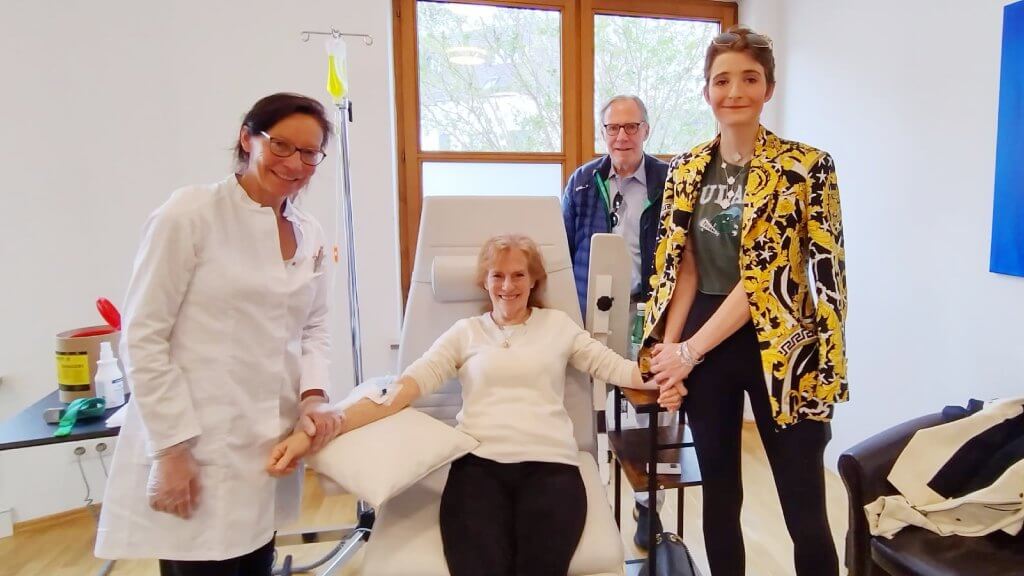
Инновационное лечение рака легкого в Германии дарит пациентам новую надежду
Диагноз «метастатический рак легкого», особенно на 4 стадии, повергает пациента в шок и вызывает отчаяние. В таких ситуация врачи зачастую говорят онкобольному, что они практически ничем не могут ему помочь. Тем не менее, благодаря стремительному развитию медицины, и методов лечения рака легкого 4 стадии в частности, этот диагноз теперь не является смертным приговором.
Германия занимает лидирующие позиции в области предоставления современного лечения онкологических заболеваний. В этой стране пациентам предлагаются новые и при этом надежные виды терапии, которые способствуют улучшению результатов лечения, – от иммунотерапии дендритными клетками и TACE до высокоточной таргетной терапии и интервенционных вмешательств под визуальным контролем. Следовательно, теперь у пациентов есть доступ к персонализированным видам терапии, о которых еще десять лет назад приходилось только мечтать. Лечение с проведением инновационных лечебных процедур во многих случаях предполагает более короткое пребывание пациента в стационаре и значительно меньшее количество побочных эффектов по сравнению с традиционной химиотерапией.
Booking Health поддерживает тесное сотрудничество с ведущими онкологическими центрами Германии, что дает возможность предлагать пациентам из различных уголков мира услугу «второе мнение», мультимодальную терапию и диагностику в режиме реального времени для отслеживания результатов лечения.
Если у вас или у кого-то из ваших близких диагностировали рак легкого на поздней стадии, ни в коем случае нельзя опускать руки, ведь даже на этой стадии заболевания всегда есть надежда на хороший результат лечения. Высококлассные немецкие специалисты готовы помочь вам сделать шаг навстречу последним достижениям науки и терапевтическим возможностям, которые открывают новые перспективы в борьбе с раком.
Поездка на лечение за границу с Booking Health
Самостоятельный поиск наилучшей тактики лечения с учетом вашей индивидуальной клинической ситуации – довольно сложная задача. Испытав на себе многочисленные курсы лечения, проконсультировавшись со множеством специалистов и испробовав различные терапевтические процедуры, вам может быть трудно сориентироваться во всей предоставленной врачами информации. В таком случае пациенты зачастую выбирают первый же предложенный вариант лечения или соглашаются на лечение с применением стандартизированных терапевтических протоколов, которое повлечет за собой множество побочных эффектов, вместо того, чтобы рассмотреть возможность терапии с помощью инновационных процедур.
Если вы хотите сделать осознанный выбор и получить лечение рака в соответствии с индивидуально разработанной для вас схемой с учетом особенностей вашей конкретной клинической ситуации, проконсультируйтесь с врачами-консультантами Booking Health. Компания Booking Health уже более 12 лет занимает ведущие позиции в сфере организации лечения за рубежом с применением новейших инноваций в медицине, поэтому ее специалисты обладают огромным опытом в составлении персонализированных комплексных программ лечения для каждого пациента. Booking Health пользуется репутацией авторитетной компании, которая предоставляет персонализированный подбор схемы лечения рака легкого и клиники с прямым бронированием приема в медицинском центре и полной поддержкой на каждом этапе лечения – от решения организационных вопросов до помощи в процессе лечения. Мы предлагаем:
- Оценку и анализ медицинских заключений пациента
- Составление индивидуальной программы лечения
- Подбор подходящего медицинского учреждения для лечения
- Подготовку медицинской документации и ее направление в выбранную пациентом для лечения клинику
- Консультации с врачами зарубежной клиники для разработки оптимальной медицинской программы на этапе подготовки к поездке на лечение
- Экспертные консультации во время пребывания в больнице
- Последующее консультирование пациента после его возвращения на родину по завершении медицинской программы
- Решение организационных вопросов в рамках подготовки к поездке на лечение за границу
- Координацию пребывания пациента в другой стране, помощь в бронировании отеля или апартаментов на период лечения
- Помощь в оформлении визы и бронировании авиабилетов
- Услуги переводчика и персонального координатора, который будет с вами на связи 24/7
- Прозрачные цены на лечение без скрытых платежей
Здоровье – главная ценность в жизни каждого человека, доверять заботу о которой стоит лишь лучшим специалистам с богатым опытом и проверенной репутацией. Booking Health – это ваш надежный партнер, который оказывает всестороннюю помощь на пути к восстановлению здоровья и улучшению качества жизни. Свяжитесь с врачом-консультантом компании, чтобы узнать больше о возможностях персонализированного лечения рака легкого у ведущих экспертов с использованием инновационных методов.
Частые вопросы о лечении рака легкого в Германии
Отправить запрос на лечениеК числу лучших медучреждений в этой области относятся Специализированная пульмонологическая клиника Асклепиос Мюнхен-Гаутинг, Евангелическая пульмонологическая клиника Берлин, Университетская клиника Мюнхенского университета им. Людвига-Максимилиана и Клиника ViDia Карлсруэ. Каждый из этих центров славится своим выдающимся качеством медицинских услуг в области торакальной онкологии и пульмонологии.
В Германии применяются такие методы лечения: хирургические вмешательства, химиотерапия, лучевая терапия, иммунотерапия, таргетная терапия и методы интервенционной радиологии, например, трансартериальная химиоэмболизация (TACE).
Да, в большинстве сертифицированных клиник в Германии предлагается иммунотерапия, включая лечение ингибиторами контрольных точек иммунного ответа и терапия дендритными клетками.
Стоимость лечения рака легкого различается в зависимости от уровня клиники, в которой оно будет проводится, и назначенной терапевтической схемы. За счет прямых контрактов Booking Health с клиниками компания помогает пациентам сэкономить до 50% стоимости лечения.
Показатели успешности лечения рака легкого зависят от типа и стадии рака, но особый акцент специалистов в Германии на персонализированную мультимодальную медицинскую помощь способствует повышению показателей выживаемости и качества жизни пациентов.
Да, Booking Health поможет получить «второе мнение» ведущих немецких специалистов.
Выбирайте лечение за рубежом и Вы, несомненно, получите отличный результат!
Авторы:
Статья составлена под редакцией экспертов в области медицины, врачей-специалистов доктора Надежды Иванисовой и доктора Богданf Михальнюка. Для лечения состояний, о которых идет речь в статье, необходимо обратиться к врачу; информация в статье не предназначена для самолечения!
С редакционной политикой, которая отражает наше стремление к точности и прозрачности, можно ознакомиться здесь. Перейдите по ссылке, чтобы ознакомиться с нашими правилами.
Источники:
[1] Cancer in Germany 2019/2020. 3.12 Lung.
[2] The Robert Koch Institute is a Federal Institute within the portfolio of the Federal Ministry of Health. Lung cancer. https://www.krebsdaten.de/Krebs/EN/Content/Cancer_sites/Lung_cancer/lung_cancer_node.html
[3] American Cancer Society. Can Lung Cancer Be Found Early? https://www.cancer.org/cancer/types/lung-cancer/detection-diagnosis-staging/detection.html
[4] PubMed Central. Lung cancer: biology and treatment options. https://pmc.ncbi.nlm.nih.gov/articles/PMC4663145/
[5] PubMed. The 2011 Nobel Prize in physiology or medicine. https://pubmed.ncbi.nlm.nih.gov/22053831/
[6] American Cancer Society. Radiofrequency Ablation (RFA) for Non-Small Cell Lung Cancer. https://www.cancer.org/cancer/types/lung-cancer/treating-non-small-cell/radiofrequency-ablation.html
[7] PubMed Central. Regional Chemotherapy of the Lung: Transpulmonary Chemoembolization in Malignant Lung Tumors. https://pmc.ncbi.nlm.nih.gov/articles/PMC3709942/
Читайте:
Борьба с распространенным раком легких: передовые тактики лечения в немецкой онкологии
Лечение рака легких дендритными клетками в Германии
Комплексная иммунотерапия рака легких в Германии: от ранних стадий до метастатического процесса
Меню статьи:
- Стандартные методы в протоколах лечения рака легкого в Германии
- Передовые методы лечения в Германии
- Трансартериальная химиоэмболизация (TACE)
- Сравнительная таблица с результатами лечения рака легкого в Германии стандартными и инновационными методами
- Лучшие клиники по лечению рака легкого в Германии
- История Сьюзен Кларк Ливингстон и ее успешный опыт лечения рака легкого в Германии
- Инновационное лечение рака легкого в Германии дарит пациентам новую надежду
- Поездка на лечение за границу с Booking Health
- Частые вопросы о лечении рака легкого в Германии
Не знаете, с чего начать?
Свяжитесь с Booking Health